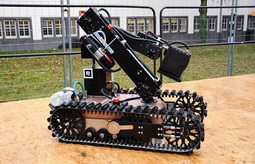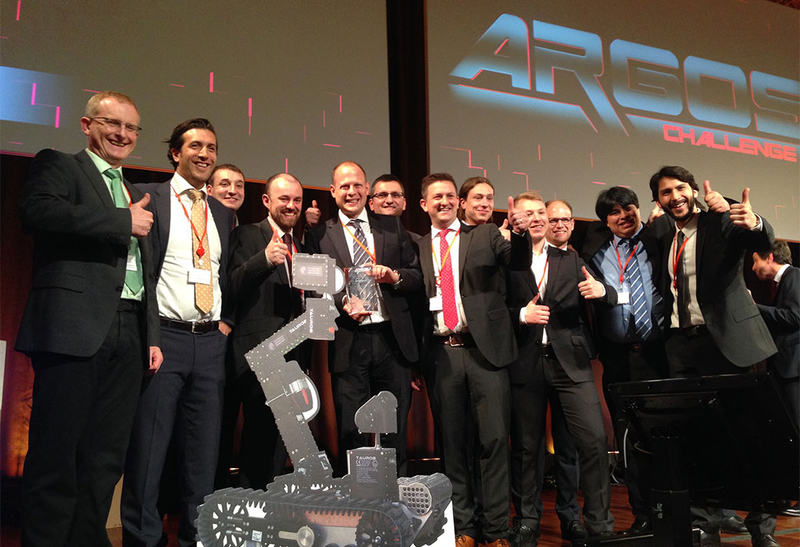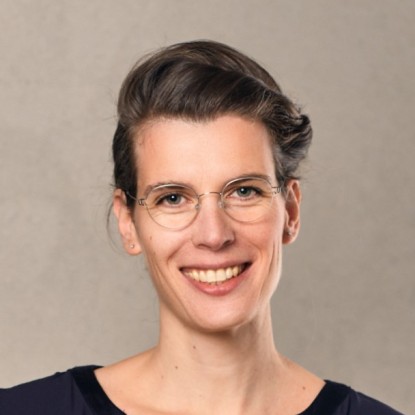Phenomenal “Argonaut”
Stage 3: Mission possible – TU Darmstadt Robot wins international challenge
15.05.2017 von Jessica Bagnoli/ Natalie Wocko /sip Translation: Natalie Wocko/ Jessica Bagnoli
Darmstadt, May 12th, 2017. The German-Austrian "Argonauts“-team has won the international ARGOS Challenge for intelligent inspection robots on oil and gas platforms, endowed with prize money of 500,000 Euros. The Argonaut developers, consisting of computer scientists from TU Darmstadt and from the cooperating partner taurob GmbH, a robotics company from Vienna, were able to outperform the strong competitors from Japan, France, Spain and Switzerland after two-and-a-half years of intense work.
The mineral oil and gas company TOTAL called for the development of an autonomous mobile remote inspection robot, which can be used on oil and gas platforms in order to decrease the high risks for platform operators. For the project supervisor of the development team in Germany, Professor Dr. Oskar von Stryk (Institute of Simulation, Systems Optimization and Robotics at the Department of Computer Science at TU Darmstadt), who has worked on the Argonaut with co-workers and students since September 2014, it was the most complex task for an intelligent service robot in an industrial environment.
An oil and gas platform is exposed to extreme weather conditions, which the robot has to master. Moreover, according to the competition’s demands, a human operator is supposed to intervene and take over teleoperation manually at any time during the complex and versatile autonomous missions, whereas afterwards, the robot must be able to end the mission autonomously. Such an autonomous robot has never existed before, neither in science nor in research. However, exactly this complexity makes it appealing to Prof. Dr. von Stryk in order to “attempt the seemingly impossible”.
During the challenge, twelve members of the development team proved, among other things, that their Argonaut is able to complete missions on a multi-storey training area under various conditions. As the robot was checking manometers, level gauges and valve positions with the help of its cameras and other high-tech sensors during its inspection rounds, it also had to detect anomalies, heat sources, gas leaks and pump defects as well as platform alarms while being able to react accordingly and inform a human operator who monitors the mission.
Challenging Weather Conditions
The tasks were complicated by adverse weather conditions during the final. The teams had to cope with heavy rain. While some teams feared the tasks, for their robots were not waterproof yet, the Argonauts were well prepared. The team had already completed various training rounds during real and simulated rain on the outdoor area of the Computer Science Department in Darmstadt on slippery stairs, which were specifically built for this occasion. To be prepared for other complex tasks, they simulated, quite pragmatically, the challenge of an “unexpected heat source” with a toaster, which the robot had to detect.
Furthermore, the robot is safe when gas leaks occur, since it is the first autonomous inspection robot in the world to have an official ATEX certificate, which means that it does not inflame an explosive atmosphere with its own electronics and can therefore be used in hostile environments. The certificate was one of the most important requirements which the jury posed for the robots.
The ambition to meet the jury’s high demands and the team’s hard work paid off at the five-day final in Pau, France. There, the Argonaut and the other four competing robots were tested intensely during the missions by the jury of eight, and on May 11th the winners of the ARGOS Challenge were announced in Paris.
Alan Gaulois, the jury president, emphasized that all the expectations were exceeded in the final and that all judges voted in unison for the Argonauts as the winning team: “The ARGONAUTS robot has the most advanced level of technological maturity of the competition. It has a very robust and well-engineered system. Moreover, the robot has been designed in a modular and adaptable way, thus allowing further enhancements in the future.” The prize money of 500,000 euros will benefit the team’s future research projects at the Department of Computer Science at TU Darmstadt as well as their cooperating partners, taurob GmbH in Vienna.
After further development and examination phases, the Argonaut, with its various skills, could also be used in other areas than on oil and gas platforms. Since it was developed to work in areas that are dangerous to humans, it could be used in the chemical industry or for human rescue purposes. Responsible for the Argonaut’s all-round skills is a modular hardware and software architecture, which allows to transfer certain skills in different configurations to further areas of application.




